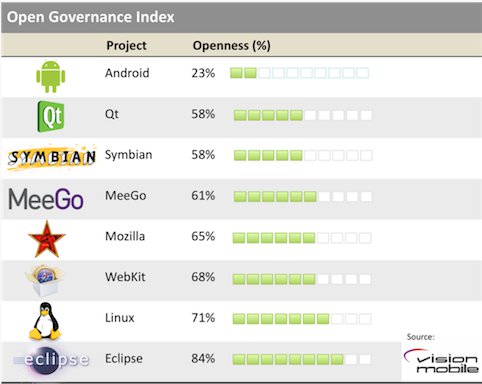Vision Mobile recently released a report about different open source projects analyzing their openness via their Open Governance Index.
The full report (45-pages) examines:
- Open source cultural roots and working upstream vs downstream
- Open source licenses vs governance models
- Analysis and classification of governance models
- In-depth reviews of Android, Qt, Symbian, MeeGo, Mozilla, WebKit, Linux and Eclipse
- Best practices in creating an open source project
The governance index is not only based on the percentage of source code that is open, but on the whole software development including the transparency of the decision making-process, the involvement of the community in all aspects of the project, compliance requirements and more. There are a total of 13 metrics accross 4 area of governance:
- Access: availability of the latest source code, developer support mechanisms, public roadmap, and transparency of decision-making
- Development: the ability of developers to influence the content and direction of the project
- Derivatives: the ability for developers to create and distribute derivatives of the source code in the form of spin-off projects, handsets or applications.
- Community: a community structure that does not discriminate between developers
Android scores last with an Index of 23% and Eclipse first with an Index of 84%. See the full results below.

Vision Mobile explains that openness usually helps a project being successful, with Android being a paradox (as it is mostly closed), but they explain Android can still be successful because of their financial involvement, the quality of their engineering team and the fact that Android is available free of charge.

Jean-Luc started CNX Software in 2010 as a part-time endeavor, before quitting his job as a software engineering manager, and starting to write daily news, and reviews full time later in 2011.
Support CNX Software! Donate via cryptocurrencies, become a Patron on Patreon, or purchase goods on Amazon or Aliexpress




